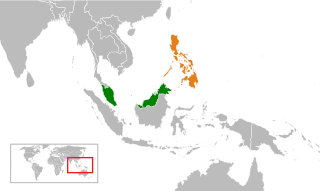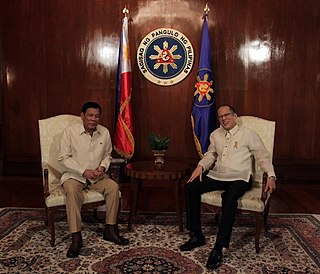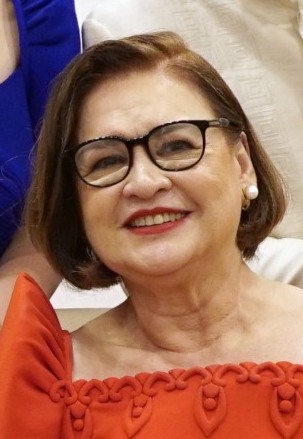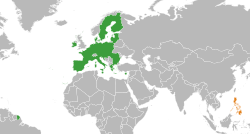
Benigno Simeon Aquino III, also known as Noynoy Aquino and colloquially as PNoy, was a Filipino politician who served as the 15th President of the Philippines from 2010 to 2016. The son of assassinated politician Benigno Aquino Jr. and 11th President of the Philippines Corazon Aquino, he was a fourth-generation politician as part of the Aquino family of Tarlac.

This article covers the history of the current Philippine republican state following the 1986 People Power Revolution, known as the Fifth Philippine Republic.

Rodrigo Roa Duterte, also known as Digong, Rody, and by the initials DU30 and PRRD, is a Filipino lawyer and politician who served as the 16th president of the Philippines from 2016 to 2022. He is the chairperson of Partido Demokratiko Pilipino, the ruling political party in the Philippines during his presidency. Duterte is the first president of the Philippines to be from Mindanao, and is the oldest person to assume office, beginning his term at age 71.

Bando Osmeña – Pundok Kauswagan, commonly known as BO–PK or BOPK, is a local political party based in Cebu City, Philippines. It is a political party run by the Osmeña family of Cebu since 1987 when Tomas Osmeña first ran for mayor of Cebu City. Although not a registered political party with the Commission on Elections (COMELEC), it has been used by Osmeña and his allies since 1998 when he ran with Alvin Garcia as vice mayor.
The Davao Death Squad (DDS) is a vigilante group in Davao City, Philippines. The group is alleged to have conducted summary executions of street children and individuals suspected of petty crimes and drug dealing. It has been estimated that the group is responsible for the killing or disappearance of between 1,020 and 1,040 people between 1998 and 2008. The 2009 report by the CHR noted stonewalling by local police under the mayorship of Rodrigo Duterte while a leaked cable observed a lack of public outrage among Davao residents.

Malaysia–Philippines relations refers to the bilateral relations between Malaysia and the Philippines. The Philippines has an embassy in Kuala Lumpur, and Malaysia has an embassy in Manila and a consulate general in Davao City. The people of the two neighbouring countries have a long history of cultural and political relations.

Philippines–Russia relations are the bilateral relations between Russia and the Philippines. Both countries are full members of APEC.

Typhoon Haiyan, known in the Philippines as Super Typhoon Yolanda, was one of the most powerful tropical cyclones ever recorded. Upon making landfall, Haiyan devastated portions of Southeast Asia, particularly the Philippines. It is one of the deadliest Philippine typhoons on record, killing at least 6,300 people in that country alone. In terms of JTWC-estimated 1-minute sustained winds, Haiyan is tied with Meranti in 2016 for being the second strongest landfalling tropical cyclone on record, only behind Goni of 2020. Haiyan was also the most intense tropical cyclone worldwide in 2013.
The prevalence of illegal drug use in the Philippines is lower than the global average, according to the United Nations Office on Drugs and Crime (UNODC). President Rodrigo Duterte has claimed that the country could become a "narco-state". Two of the most used and valuable illegal drugs in the country are methamphetamine hydrochloride and marijuana. In 2012, the United Nations said the Philippines had the highest rate of methamphetamine use in East Asia, and according to a U.S. State Department report, 2.1 percent of Filipinos aged 16 to 64 use the drug based on 2008 figures by the Philippines Dangerous Drugs Board. As of 2016, the United Nations Office of Drugs and Crime report that 1.1 percent of Filipinos aged 10 to 69 use the drug. In Metro Manila, most barangays are affected by illegal drugs.
The Enhanced Defense Cooperation Agreement (EDCA) is an agreement between the United States and the Philippines intended to bolster the American–Philippine alliance. The agreement allows the United States to rotate troops into the Philippines for extended stays and allows the United States to build and operate facilities on Philippine bases for both American and Philippine forces. The U.S. is not allowed to establish any permanent military bases. The Philippines have personnel access to American ships and planes. This agreement has been the subject of criticism by some leftist groups in the Philippines.

The political positions of Rodrigo Duterte, the 16th President of the Philippines, have been difficult to define coherently into what some analysts have attempted to package as "Dutertism" or "Dutertismo" due to numerous policy shifts during his presidency.
The following are the events in related to Philippine law in 2016. This includes developments in criminal investigations of national notability.

The presidential transition of Rodrigo Duterte started when then-Davao City mayor Rodrigo Duterte won the Philippine presidential election on May 9, 2016. Duterte topped the official count by the Congress of the Philippines on May 27, 2016, with 16,601,997 votes, 6.6 million more than his closest rival. The joint bicameral Congress proclaimed Duterte as the President-elect and Leni Robredo as the Vice President-elect on May 30, 2016.

Elizabeth Abellana Zimmerman is the former wife of Rodrigo Duterte, the 16th President of the Philippines, and the mother of incumbent Vice President Sara Duterte.

Rodrigo Duterte's six-year tenure as the 16th President of the Philippines began on June 30, 2016, succeeding Benigno Aquino III. He was the first president from Mindanao, the first president to have worked in all three branches of government, and the oldest to be elected. He won the election amid growing frustration with post-EDSA governance that favored elites over ordinary Filipinos. His tenure ended on June 30, 2022.

The War on Drugs is the intensified anti-drug campaign that began during the administration of President Rodrigo Duterte, who served office from June 30, 2016, to June 30, 2022. The campaign reduced drug proliferation in the country, but has been marred by extrajudicial killings allegedly perpetrated by the police and unknown assailants. By 2022, the number of drug suspects killed since 2016 was officially tallied by the government as 6,252; human rights organizations and academics, however, estimate that 12,000 to 30,000 civilians have been killed in "anti-drug operations" carried out by the Philippine National Police and vigilantes.

Mactan–Cebu International Airport (MCIA) is an international airport serving Cebu and serves as the main gateway to the Central Visayas region in the Philippines. Located on a 797-hectare (1,970-acre) site in Lapu-Lapu City on Mactan, it is the second busiest airport in the Philippines. Opened on April 27, 1966, the airport serves as a hub for Philippine Airlines, and as an operating base for Cebu Pacific, Philippines AirAsia, and Sunlight Air.

Wilma Tiamzon was a Filipino political organizer and until her arrest in March 2014 by Philippine security forces, believed to be the Secretary-General of the Communist Party of the Philippines (CPP) and its armed wing, the New People's Army (NPA).
The first 100 days of Rodrigo Duterte's presidency began on June 30, 2016, the day Rodrigo Duterte was inaugurated as the 16th president of the Philippines. The concept of the first 100 days of a presidential term was first adopted in the Philippines by President Corazon Aquino from the United States and has since been used as a gauge of presidential success and activism, and is a considered the "honeymoon period" where traditional critics are urged to refrain from detracting the new president. The 100th day of his presidency ended at noon on October 8, 2016.
The following article details the reactions, both local and international, to the Philippine drug war.
















